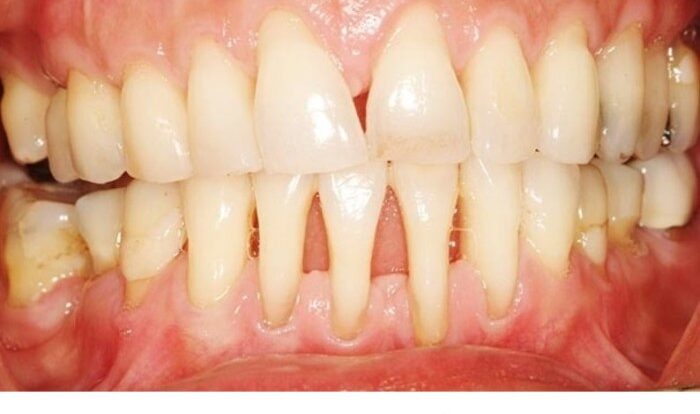
Gum disease is a common problem that can lead to serious health issues if left untreated. But what if you don’t have access to a dentist? How to cure gum disease without a dentist? This guide will provide you with everything you need to know about treating gum disease at home, from natural remedies to lifestyle changes and over-the-counter treatments.
In this comprehensive guide, we’ll explore the causes of gum disease, discuss the different stages of the disease, and provide you with step-by-step instructions on how to treat gum disease at home. We’ll also provide you with tips on how to prevent gum disease from coming back.
Home Remedies for Gum Disease
Gum disease, also known as periodontal disease, is a common condition that affects the gums and the tissues supporting the teeth. It can range from mild inflammation to severe infection, and if left untreated, can lead to tooth loss. While professional dental care is the most effective way to treat gum disease, there are also several natural remedies that can help to alleviate symptoms and improve oral health.
It’s important to note that these remedies are not a substitute for professional dental care, and should be used in conjunction with regular dental checkups and cleanings. Additionally, some remedies may not be suitable for everyone, and it’s always best to consult with a healthcare professional before using any new home remedies.
Salt Water Rinses
Salt water rinses are a simple and effective way to reduce inflammation and kill bacteria in the mouth. To make a salt water rinse, dissolve 1/2 teaspoon of salt in 8 ounces of warm water. Rinse your mouth with the solution for 30 seconds, then spit it out.
You can repeat this process several times a day.
Turmeric
Turmeric is a spice that has antibacterial and anti-inflammatory properties. It can be used to make a paste that can be applied to the gums. To make a turmeric paste, mix 1 teaspoon of turmeric powder with 1/2 teaspoon of water.
To cure gum disease without a dentist, it is important to maintain good oral hygiene by brushing and flossing regularly. If you are experiencing any symptoms of gum disease, such as bleeding or swollen gums, it is important to consult a healthcare professional.
However, if you are unable to see a dentist, there are some home remedies that may help to alleviate the symptoms. For more information on how to cure gum disease without a dentist, click here .
Apply the paste to the gums and leave it on for 5-10 minutes, then rinse your mouth with water.
Gum disease is a common problem that can lead to serious health issues if left untreated. While it’s best to see a dentist for professional treatment, there are some things you can do at home to help cure gum disease.
Click here for more information on how to cure gum disease without a dentist.
Tea Tree Oil
Tea tree oil is an essential oil that has antibacterial and antifungal properties. It can be used to make a mouthwash that can help to reduce inflammation and kill bacteria. To make a tea tree oil mouthwash, add 5 drops of tea tree oil to 8 ounces of water.
Gum disease can be a pain, but there are ways to cure it without a dentist. One way is to use a mouthwash that contains chlorhexidine, which is an antibacterial agent. Another way is to use a toothpaste that contains fluoride, which helps to strengthen teeth and prevent cavities.
If you’re looking for more information on how to cure gum disease without a dentist, check out Prince Georges Mecconline . They have a lot of great resources on how to keep your teeth and gums healthy.
Rinse your mouth with the solution for 30 seconds, then spit it out. You can repeat this process several times a day.
Aloe Vera
Aloe vera is a plant that has anti-inflammatory and antibacterial properties. It can be used to make a gel that can be applied to the gums. To make an aloe vera gel, cut an aloe vera leaf open and scoop out the gel.
Apply the gel to the gums and leave it on for 5-10 minutes, then rinse your mouth with water.
If you’re suffering from gum disease, you don’t have to visit a dentist to find relief. There are many effective home remedies that can help you cure your gum disease without the need for expensive dental treatments. Check out this article to learn more about how to cure gum disease without a dentist and get started on your journey to a healthier smile.
Lifestyle Modifications for Gum Health
Maintaining a healthy lifestyle plays a crucial role in preventing and treating gum disease. Certain habits and choices can significantly impact the health of your gums. By adopting positive lifestyle modifications, you can improve gum health and reduce the risk of developing gum disease.
Here are some essential lifestyle changes that can benefit your gum health:
Quitting Smoking, How to cure gum disease without a dentist
Smoking is a major risk factor for gum disease. The chemicals in cigarettes damage the gum tissue, making it more susceptible to infection. Quitting smoking is one of the most important things you can do to improve your gum health and overall well-being.
Reducing Stress
Chronic stress can weaken the immune system, making it more difficult for your body to fight off infections, including gum disease. Finding healthy ways to manage stress, such as exercise, yoga, or meditation, can help improve gum health.
Maintaining a Balanced Diet
A balanced diet rich in fruits, vegetables, and whole grains provides essential nutrients for healthy gums. Vitamin C is particularly important for gum health, as it helps strengthen the connective tissue that supports the gums. Calcium and phosphorus are also important for maintaining strong teeth and bones.
Regular Dental Checkups and Professional Cleanings
Regular dental checkups and professional cleanings are essential for preventing and treating gum disease. During a checkup, your dentist will examine your gums for signs of inflammation or infection. They will also perform a professional cleaning to remove plaque and tartar buildup, which can contribute to gum disease.
Over-the-Counter Treatments for Gum Disease
Over-the-counter (OTC) treatments can help manage gum disease symptoms and prevent further progression. Here’s a comparison of common OTC products and their key features:
| Product Type | Active Ingredients | Efficacy | Potential Side Effects |
|---|---|---|---|
| Mouthwashes | Chlorhexidine, cetylpyridinium chloride, essential oils (e.g., tea tree oil, eucalyptus oil) | Reduce plaque and bacteria, freshen breath | Staining, taste disturbance, irritation |
| Gels | Benzoyl peroxide, triclosan, hydrogen peroxide | Kill bacteria, reduce inflammation | Gum irritation, sensitivity |
| Toothpastes | Fluoride, triclosan, baking soda | Prevent plaque formation, strengthen enamel | Mild irritation, taste disturbance |
| Dental Floss | Waxed, unwaxed, flavored | Remove plaque and food debris | Gum irritation if used aggressively |
| Interdental Brushes | Small brushes designed for cleaning between teeth | Remove plaque and food debris, reduce gum inflammation | Gum irritation if used incorrectly |
Choosing the best OTC product depends on individual needs. For mild gum disease, mouthwashes or toothpastes with antibacterial agents may suffice. For more severe cases, gels or dental floss can be used in combination. Consult a dental professional for personalized recommendations.
Advanced Treatments for Severe Gum Disease

When gum disease progresses to an advanced stage, it may require more extensive treatments to restore oral health. These treatments can range from non-surgical procedures to surgical interventions, each with its own benefits and risks. Understanding the available options is crucial for making informed decisions about your gum health.
Non-Surgical Treatments
Non-surgical treatments are often the first line of defense against advanced gum disease. These procedures aim to remove plaque and bacteria from the affected areas without cutting into the gums.
- Scaling and Root Planing:This deep cleaning procedure involves using special instruments to remove tartar and bacteria from the surfaces of the teeth and below the gum line. It is a common treatment for periodontitis, an advanced form of gum disease.
- Laser Therapy:Laser therapy utilizes a focused beam of light to target and remove diseased tissue from the gums. It is less invasive than traditional scaling and root planing and may offer faster healing times.
Surgical Treatments
In cases where non-surgical treatments are not sufficient, surgical interventions may be necessary. These procedures involve cutting into the gums to remove diseased tissue and repair damaged structures.
- Periodontal Surgery:This surgical procedure aims to remove diseased tissue, reduce periodontal pockets (spaces between the teeth and gums), and restore the gum line to a healthy position. It is typically used to treat severe periodontitis.
- Gum Grafting:Gum grafting involves taking tissue from another part of the mouth or from a donor and attaching it to the affected area to cover exposed tooth roots. This procedure is used to treat gum recession, a condition where the gums recede from the teeth, exposing the root surface.
If you’re looking for a way to cure gum disease without having to visit the dentist, there are a few things you can do. Check out this article for more information on how to cure gum disease without a dentist.
It covers some simple steps you can take to improve your oral health and get rid of gum disease for good.
It is important to consult with a qualified dental professional before opting for any advanced treatments for gum disease. They can assess the severity of your condition and recommend the most appropriate course of action. Proper diagnosis and treatment planning are crucial for successful outcomes and long-term oral health.
Preventative Measures for Gum Disease
Gum disease, also known as periodontal disease, is a common condition that affects the gums and supporting structures of the teeth. It can lead to inflammation, bleeding, and even tooth loss. Fortunately, there are many things you can do to prevent gum disease, including:
Maintaining good oral hygiene is essential for preventing gum disease. This includes brushing your teeth twice a day with a fluoride toothpaste and flossing once a day. Fluoride helps to strengthen the teeth and prevent cavities, while flossing removes plaque and bacteria from between the teeth.
It’s also important to use a soft-bristled toothbrush and to brush gently to avoid damaging the gums.
In addition to good oral hygiene, regular dental visits are also important for preventing gum disease. Your dentist can check for signs of gum disease and provide you with professional cleaning and treatment. They can also recommend products and techniques to help you maintain good oral health.
Finally, a healthy lifestyle can also help to prevent gum disease. Eating a balanced diet that includes plenty of fruits, vegetables, and whole grains can help to boost your immune system and protect your gums from infection. Limiting sugary foods and drinks can also help to reduce your risk of gum disease.
Proper Brushing and Flossing Techniques
To effectively prevent gum disease, it’s crucial to adopt proper brushing and flossing techniques. Here are some key guidelines to follow:
- Brushing:Hold your toothbrush at a 45-degree angle to the gum line and use gentle circular motions to remove plaque and bacteria. Be sure to brush all surfaces of your teeth, including the insides, outsides, and chewing surfaces.
- Flossing:Use about 18 inches of floss and wrap it around your middle fingers. Gently slide the floss between your teeth and move it up and down along the sides of each tooth. Be careful not to snap the floss, as this can damage your gums.
Last Recap
If you’re suffering from gum disease, don’t despair. There are many things you can do to treat the disease and improve your oral health. By following the tips in this guide, you can get your gums back on track and enjoy a healthy smile for years to come.
FAQ Explained: How To Cure Gum Disease Without A Dentist
Can I cure gum disease at home without seeing a dentist?
Yes, you can cure gum disease at home without seeing a dentist. However, it is important to note that home remedies are not a substitute for professional dental care. If you have severe gum disease, you should see a dentist for treatment.
What are the best home remedies for gum disease?
There are many effective home remedies for gum disease, including salt water rinses, turmeric, tea tree oil, and aloe vera. These remedies can help to reduce inflammation, kill bacteria, and promote healing.
What lifestyle changes can I make to improve my gum health?
There are many lifestyle changes you can make to improve your gum health, including quitting smoking, reducing stress, and maintaining a balanced diet. These changes can help to reduce inflammation and improve your overall oral health.
What over-the-counter treatments can I use for gum disease?
There are a number of over-the-counter treatments available for gum disease, including mouthwashes, gels, and toothpastes. These products can help to reduce inflammation, kill bacteria, and promote healing.
How can I prevent gum disease from coming back?
There are a number of things you can do to prevent gum disease from coming back, including brushing and flossing your teeth regularly, eating a healthy diet, and avoiding sugary foods and drinks.





